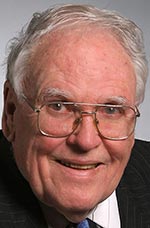WASHINGTON — Moral theologian William E. May, who taught theology for decades and wrote numerous books and scholarly articles, died Dec. 13 at age 86 surrounded by members of his family in a Maryland suburb of Washington. William E. May (CNS photo/courtesy The Catholic University of America)
William E. May (CNS photo/courtesy The Catholic University of America)
His funeral Mass was to be celebrated Dec. 20 at Holy Redeemer Parish in Kensington, Maryland, followed by burial at Gate of Heaven Cemetery in Silver Spring, Maryland.
Catholic journalist and author Russell Shaw described May as “one of the most prominent moral theologians of his day” who was “a forthright defender of orthodox Catholic faith; the prolific author of a steady stream of books and articles, scholarly and popular alike; and a dedicated teacher, who helped prepare hundreds of young men and women for academic careers and pastoral service in and to the church.”
Shaw, writing in the Dec. 16 issue of Our Sunday Visitor, also described May as a “devoted husband and father and a faithful, big-hearted friend of extraordinary generosity who was never happier than when giving others the praise he thought they deserved.”
Since 2008, May had been a senior research fellow at the Culture of Life Foundation, a Washington-based research and educational institute.
From 1991 to 2008, he was the Michael J. McGivney professor of moral theology at the Pontifical John Paul II Institute for Studies on Marriage and Family at The Catholic University of America in Washington. Before that he taught at Catholic University for 20 years.
He also taught at the Pontifical University of the Holy Cross in Rome and several other institutions. In 1986, Pope John Paul II appointed him a member of the Vatican’s International Theological Commission, a position he held through 1997. He was a theological expert at the 1987 world Synod of Bishops on the vocation and mission of the laity and was a consultor in 2003 for the Vatican’s Congregation for the Clergy.
May, who was born May 27, 1928, in St. Louis, married Patricia Ann Keck in 1958 and they had seven children.
He obtained his bachelor’s and master’s degrees from Catholic University and his doctorate from Marquette University in Milwaukee.
May’s many awards include: the Cardinal Wright Award of the Fellowship of Catholic Scholars, the St. Dominic Medal of the Dominican House of Studies in Washington, and the Pro Ecclesia et Pontifice Medal, presented to him by the late Cardinal James A. Hickey of Washington.
He was the author of more than a dozen books, including “Catholic Sexual Ethics: A Summary, Explanation, and Defense,” “Catholic Bioethics and the Gift of Human Life,” “An Introduction to Moral Theology” and “Marriage: The Rock on Which the Family Is Built.”
In July 1968, May was one of 30 scholars who signed his name to a statement dissenting from Blessed Paul VI’s encyclical “Humanae Vitae,” which affirmed Catholic teaching against artificial contraception, an action he said he deeply regretted later.
During a panel discussion at a 1993 conference on “Humanae Vitae” in Omaha, Nebraska, May said he signed a document shortly after earning his doctorate and said it was “in no way an act of courage, but cowardice.”
He said he changed his mind while studying moral theology closely to prepare for teaching a course and said he “realized quite clearly what the acceptance of contraception meant.”
May said he recognized that the encyclical was far more than a reaffirmation of the church’s teaching on contraception but was a “defense of the dignity of human persons.”
He said he realized he was “morally obligated to do my best to defend this teaching,” and that by 1972, he was teaching that contraception “is indeed morally bad and is the gateway to abortion.”
May is survived by his wife, their seven children and 16 grandchildren.
